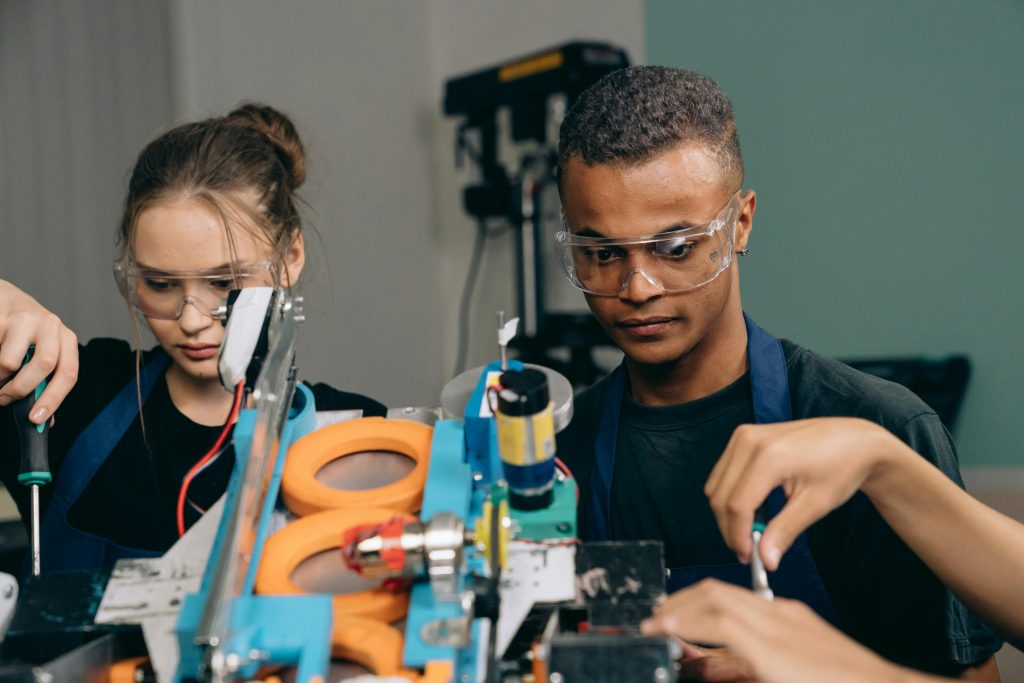By the time our kiddos grow to be 16, 17 or 18 years old, thoughts like “Which college am I going to go to?” and “What career path do I want to choose?” have already flooded their minds. For many students, the pressure of getting into college can be overwhelming, especially if the student isn’t quite sure if they even want to go to college. The good news, for students and parents, is that college is not the only option! There are multiple routes that your teen can take post-graduation to set them up for great success in their future career. Let’s explore some college alternatives for your teen.
TRADE SCHOOLS
Trade schools teach hands-on skills for many different vocations. This type of education can typically last anywhere from one to two years, and they often equip the student with a job certification. One of the most beneficial aspects of a trade school is that when a student is done with their specific program, they can take their experience and head straight into their career. Many community colleges offer separate trade school programs, which may be a more affordable option. To make sure your child chooses the best trade school for them, NerdWallet suggests searching through the Department of Education’s College Scorecard to compare different programs, costs and expected salaries after graduation.
Common, high paying trade jobs: technician, licensed practical nurse, welder, electrician, construction manager, dental hygienist
APPRENTICESHIPS
An apprenticeship can be thought of as “job-based learning,” according to NerdWallet. Students earn working wages, typically starting out at $15 an hour, while receiving on-the-job training and some classroom instruction. Apprenticeships can last anywhere from one to six years, depending on the program and career type. These programs are great for hands-on students who learn by example, and they allow students to work while they are getting an education. Some apprenticeships may be hard to find, as they are limited to certain fields. Search through apprenticeship.gov to find programs near you!
Common occupations with apprenticeship programs: Carpenter, electrician, masonry, human resources, welder
Less common occupations with apprenticeship programs: chef, hairstylist, nail technician, photographer
CODING BOOTCAMPS
The world of coding is still thriving. Not sure what coding is? The Code Conquest website explains in layman’s terms, “Coding is what makes it possible for us to create computer software, apps and websites. Your browser, your OS, the apps on your phone, Facebook… they’re all made with code.” If your student loves technology, maybe a coding bootcamp is right for them? These camps are the fastest way to learn how to code, averaging about 4 months to complete. While these programs are on the expensive side, they have high success rates and can help students find high- paying jobs quickly. Use a resource like the Council on Integrity in Results Reporting (cirr.org) to help you verify different programs and their success rates.
Common coding occupations: web developer, software developer, data scientist, product designer, graphic/web designer
MILITARY
Joining the military after graduation is not only one of the most honorable things that you can do for your country but it can also give students a great sense of identity and purpose. The military can set students on a steady path to be trained in different fields, travel the world and one day receive a college degree (with tuition assistance from the military). Joining the military can also provide steady pay, health insurance and future job opportunities. All branches of the military offer these benefits for graduating high school students, so if your teen is interested, visit www.usa.gov/ join-military to learn more!
AMERICORPS AND OTHER VOLUNTEER OPPORTUNITIES
Does your teen have the heart to serve others and give back? They should consider volunteering with an organization like AmeriCorps! According to their website, AmeriCorps is a “network of national service programs, made up of three primary programs that each take a different approach to improving lives and fostering civic engagement.” Your student could serve the country and community by mentoring youth, protecting national parks, participating in disaster prep/relief and more. Members enjoy perks like living allowances, health benefits, education assistance and student loan deferment, as well as career opportunities with leading employers and applicable training. To learn more about AmeriCorps, visit nationalservice.gov. To learn about other service opportunities around the country and the world, visit these sites: gviusa.com, volunteering.org.za, volunteerhq.org and viaprograms.org.
Related articles:
How To Break Out Of Adult Acne
Money Saving Apps At Your Fingertips
Glowing Skin: Developing A Healthy Skin Care Routine For Teens
Talk To Me: How To Get Your Teens To Open Up

